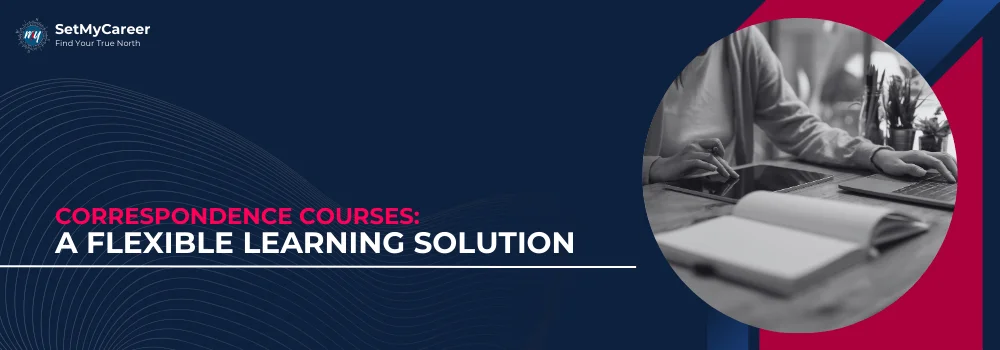
Published by Dr. Nandkishore Rathi on 19 March 2025
Chief Career Navigator
Dr. Nandkishore Rathi is passionate about identifying people's passions and helping them create and lead successful and fulfilling careers. With 30+ years of experience and interactions with thousands of students, academicians, and corporate executives, he has developed a range of career services aimed at benefiting individuals seeking a breakthrough in their professional lives.
A complete guide to correspondence courses in India—flexibility, top universities, application process, and credibility checks.

Ever wished you could attend college from your couch, in your pajamas, with a cup of chai in hand? Welcome to the world of correspondence courses! Also known as distance education, these programs allow students to earn degrees without attending physical classes. Learning materials are delivered via mail, email, or online platforms, enabling flexible, self-paced study. Whether you’re a working professional, a stay-at-home parent, or someone avoiding daily commutes, correspondence courses offer a way to gain employable skills without disrupting your routine.
A correspondence course, or distance learning, is a flexible education model that allows students to study remotely. Course materials such as textbooks, assignments, and recorded lectures are provided via mail or digital platforms.
These courses emphasize independent study, with minimal direct interaction with instructors. They cater to students who need flexible learning options due to geographical, professional, or personal constraints. While correspondence courses follow a structured curriculum, they allow students to balance learning with other responsibilities to fast-track their career advancement.
India’s education system is vast, but traditional college degrees aren’t feasible for everyone. Here’s why correspondence courses are a game-changer:
Flexibility – Study anytime, anywhere, at your own pace.
Affordability – Lower tuition fees with minimal additional expenses.
Ideal for Working Professionals – Earn a degree while continuing your job.
Skill Enhancement – Upgrade qualifications without career breaks.
Inclusive Learning – Accessible for students in remote areas or with mobility constraints.
Applying for a correspondence course is straight forward:
Choose a Recognized University – Ensure the institution is UGC-DEB accredited.
Select Your Course – Pick a program aligned with your career goals.
Check Eligibility – Requirements vary based on course level.
Fill Out the Application – Available online or at university centers.
Submit Documents – Typically includes educational certificates and ID proof.
Pay Fees – Online payment, bank draft, or other accepted methods.
Receive Study Material – Delivered via post or digital platforms.
Start Studying! – Engage in self-paced learning and prepare for exams.

Join thousands of learners who are upgrading their careers with flexible, affordable correspondence courses.
Enroll nowCorrespondent courses are open to all with individual differences in eligibility criteria for courses at various levels. Students looking to gain specific skills quickly, working professionals who want to work and study simultaneously and individuals who are restarting career after a break can greatly benefit from such courses. Eligibility criteria are generally flexible:
Undergraduate Programs – 10+2 (higher secondary education) from a recognized board.
Postgraduate Programs – Bachelor’s degree in a relevant field.
Diploma/Certification Courses – Varies; some require basic qualifications, others are open to all.
Working Professionals – Many universities offer specialized programs for experienced candidates.
Correspondence courses provide flexibility, affordability, and accessibility. However, they require self-motivation and lack the structured environment of traditional programs. While traditional courses offer face-to-face interaction, networking, and hands-on learning, correspondence courses allow individuals to learn at their own pace without rigid schedules. Distance learning degrees are increasingly recognized, though some employers may still favor traditional qualifications. Choosing a course should depend on personal circumstances and career goals.
While correspondence education has many benefits, challenges include:
Self-Discipline Required – Students must stay motivated and manage time effectively.
Limited Peer Interaction – Minimal face-to-face engagement with students and instructors.
Fewer Practical Learning Opportunities – Hands-on subjects like engineering or medicine may not be fully supported.
Employability Concerns – Some employers still prefer traditional degrees.
Technology Dependence – Many courses rely on digital platforms, which can be a barrier for students with limited internet access.
Several prestigious institutions provide quality distance education. Here are some top choices:
Indira Gandhi National Open University (IGNOU) – Offers UG, PG, diploma, and certificate programs with affordable fees.
University of Mumbai - IDOL – One of the oldest distance education programs, popular for B.Com, B.A., and M.Com courses.
Annamalai University (DDE) – Well-known for management, arts, and science programs.
Symbiosis Centre for Distance Learning (SCDL) – Recognized for industry-oriented programs, especially in management and IT.
Dr. B.R. Ambedkar Open University (BRAOU) – Focuses on inclusive education with accessible, affordable courses.
Sikkim Manipal University (SMU-DE) – Strong online learning platform, known for tech and management programs.
Karnataka State Open University (KSOU) – Offers humanities, commerce, and science courses with government recognition.
Tamil Nadu Open University (TNOU) – Affordable, accessible education with specialized vocational programs.
Amity University - Distance Learning – Private university with modern online tools, popular for business and IT programs.
Delhi University School of Open Learning (DU SOL) – Prestigious institution offering structured B.A. and B.Com programs.
Distance education caters to various career paths through general, professional, and skill-based programs.
General Degree Programs – Provide academic foundations with career flexibility.
Undergraduate: B.A. (English, History, Sociology), B.Com (Finance, Business), B.Sc (Math, Physics, CS).
Postgraduate: M.A. (Psychology, Economics), M.Com (Banking, Corporate Finance), M.Sc (IT, Environmental Science).
Professional Degree Programs – Designed for career advancement.
Business & Management: BBA, MBA (Finance, Marketing, HR, IT).
Law & Education: LLB (offered by select universities), B.Ed (teacher training).
Technology & IT: BCA, MCA.
Healthcare & Allied Fields: B.Sc Nursing (limited universities), Diploma in Nutrition & Health Education.
Skill-Based & Vocational Programs – Industry-relevant certifications.
Media & Communication: Diploma in Journalism, Certificate in Digital Marketing.
Finance & Business: Diploma in Financial Management, Certified Investment Banking Course.
Education & Training: Diploma in Early Childhood Education, Certificate in Special Education.
Technology & IT: Diploma in Web Development, Certificate in Cybersecurity.
Correspondence courses are like the Netflix of education—watch (or study) whenever, wherever, at your own pace! Whether you’re a student looking for flexibility, a professional wanting to upskill, or someone who missed out on formal education, distance learning offers a second chance to achieve your dream career. So, if the traditional college setup isn't for you, why not give correspondence courses a shot?
No. 14/595, 1st Floor, Nanjappa Reddy Layout, Koramangala 8th Block, Bangalore 560095